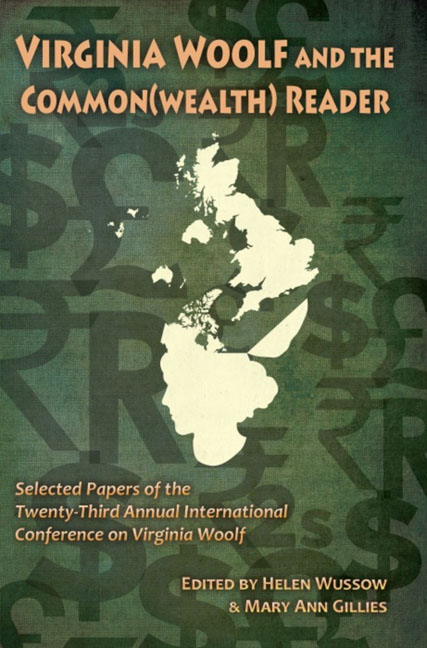Book contents
- Frontmatter
- Contents
- Introduction to Virginia Woolf and the Common(wealth) Reader
- Acknowledgments
- List of Abbreviations
- Invocations
- Networks of Affiliation: Foundations and Friends
- Education and Empire in Victorian Bloomsbury
- Synthesizing Civilizations: Leonard Woolf, the League of Nations, and the Inverse of Imperialism, 1928–1933
- James Stephen's Anti-Slavery Politics: A Woolfian Inheritance
- Networks of Empire: Virginia Woolf and the Travel Writing of Emily Eden
- Of Scrapbooks, War, and Newspapers: Leslie Stephen's Legacy
- Leslie Stephen's Science of (Ecological) Ethics
- “The Death of a Beautiful Man”: Rupert Brooke in Memory and Imagination
- Leonard Woolf and the Ceylon Civil Service: “I had come to dislike imperialism”
- Virginia Woolf in the British Commonwealth
- Woolf and the Commonwealth
- 1930s Onwards
- Woolf Beyond the Book
- Notes on Contributors
- Conference Program
Of Scrapbooks, War, and Newspapers: Leslie Stephen's Legacy
from Networks of Affiliation: Foundations and Friends
- Frontmatter
- Contents
- Introduction to Virginia Woolf and the Common(wealth) Reader
- Acknowledgments
- List of Abbreviations
- Invocations
- Networks of Affiliation: Foundations and Friends
- Education and Empire in Victorian Bloomsbury
- Synthesizing Civilizations: Leonard Woolf, the League of Nations, and the Inverse of Imperialism, 1928–1933
- James Stephen's Anti-Slavery Politics: A Woolfian Inheritance
- Networks of Empire: Virginia Woolf and the Travel Writing of Emily Eden
- Of Scrapbooks, War, and Newspapers: Leslie Stephen's Legacy
- Leslie Stephen's Science of (Ecological) Ethics
- “The Death of a Beautiful Man”: Rupert Brooke in Memory and Imagination
- Leonard Woolf and the Ceylon Civil Service: “I had come to dislike imperialism”
- Virginia Woolf in the British Commonwealth
- Woolf and the Commonwealth
- 1930s Onwards
- Woolf Beyond the Book
- Notes on Contributors
- Conference Program
Summary
Virginia Woolf's scrapbooks, particularly for Three Guineas, are legendary. Her book's discussion of women's role in preventing war literally grew out of the clippings she collected from 1931 through 1937 (Silver 255-314; TG RN).What may be less well-known is that Leslie Stephen also seems to have collected newspaper clippings and combined those with a trip to the United States in 1863 to gather “powder and shot,” in Frederic Maitland's words, “for use in England” (108). Not to “blow up St. Pauls” (D4 77), but to condemn the Times for what Stephen called its “criminal” coverage of the United States Civil War (T 92). Published in 1865, Stephen's 105-page pamphlet builds a case for the Times ’ “total ignorance of the quarrel,” lack of consistency in reporting on it, and inexcusable abuse of Americans (T 105-06).
Before looking at Stephen's argument, reactions to it, and legacy, I should point out I am not a Civil War historian. Dipping into sources for this presentation, I quickly realized I was entering a thicket from which I might never emerge. I have learned more about the Trent affair, Laird rams, Lancashire cotton, Times correspondents, and battle ins and outs than I ever wanted to know, but I resisted including that learning here. I have rapidly consulted only a few of the numerous sources available, primarily those related to Stephen's critique of England's newspaper of record, but this paper should not be taken as the final word but a way to open up this subject for further investigation. Stephen's pamphlet still has relevance for anyone trying to sort out media power and responsibility.
Virginia Woolf confesses in “A Sketch of the Past” to not knowing her sociable father, to having difficulty imagining the man who must have worn evening dress and told jokes (114). She claims she can “get” her writer father in his works, but the writer she “take[s] a bite of […] medicinally” (115), seems to be the highly regarded Victorian man of letters in his 50s and 60s, not the young man starting over and constructing a writing career in his early 30s.
- Type
- Chapter
- Information
- Virginia Woolf and the Common(wealth) Reader , pp. 39 - 44Publisher: Liverpool University PressPrint publication year: 2014



